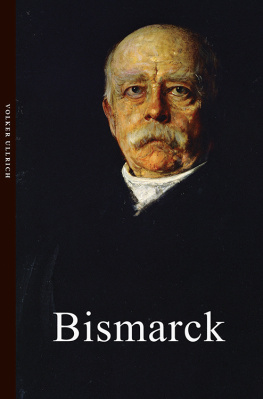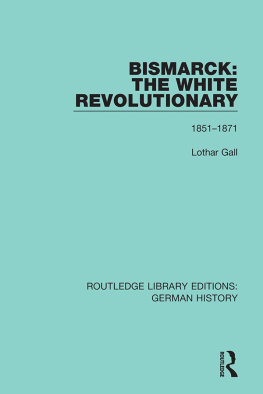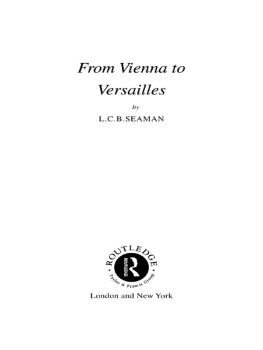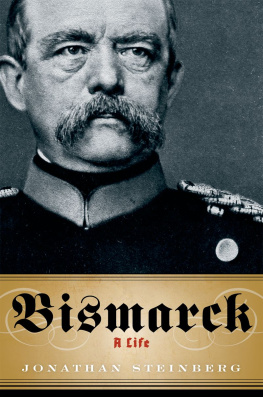BISMARCK
_____________
EDWARD CRANKSHAW

Although this study covers all the years of its subjects life, it is not a cradle-to-the-grave biography. It sets out to explore the nature of a man whose genius was fully developed long before he came to dominate the European scene. So I have treated the years of preparation and the great positive achievements of Bismarcks middle years in far greater detail than the last phase, when all the world regarded him with awe. This makes sense to me, and I hope it will make sense to the reader. When all is said, it is very rare to find a public figure past sixty whose life and work suddenly take on a new dimension. One thinks of Winston Churchill in this connection; but then he did not become prime minister until he was well into his sixties. Bismarck, on the other hand, became minister-president of Prussia when he was forty-seven, and in less than ten years he had exhibited the full range of his powers for good and evil and raised his own monument. What happened after that belongs more to the history of modern Europe than to the story of Bismarck, which in fact became very repetitive indeed.
Perhaps I should add that this book was completed and in the publishers hands before the appearance in September 1980 of Professor Lothar Galls magisterial biography. A good deal more than twice as long as the present volume, it is a major landmark in Bismarck studies. Had it appeared a year or two earlier the writing of my own book would have been made easier.
E.C.
December 1980
Contents
Part One
Preparation
Part Two
Achievement
Part Three
To What End?
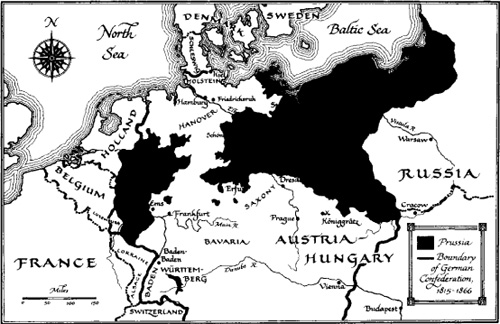
PRUSSIA AND THE GERMAN CONFEDERATION 1866
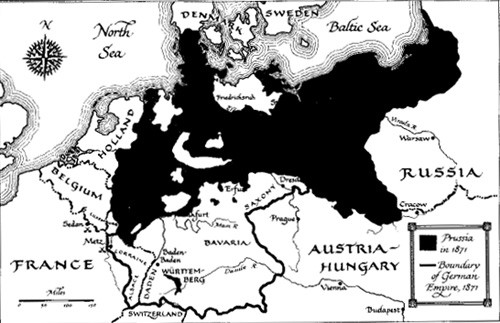
PRUSSIA AND THE GERMAN EMPIRE 1871
Part One
Preparation
a ruler of the great Germanic type, lion-like
in temperament as in the glance of his powerful eyes;
dangerous to enemies and allies, demoniacally defiant
in his strength, crushing, pitiless
ERICH MARCKS, 1902
Unfortunately there is only one great man in each
century and Bismarck is the one in ours.
PROSPER MRIME, 1864
that faithless, lawless man named Bismarck.
LORD CLARENDON, 1864
Chapter I
The Prussian Inheritance
Otto von Bismarck-Schnhausen was born in 1815 on All Fools Day. His contemporaries might usefully have taken more account of this conjunction; but no doubt they were deceived by his very solid ancestry, on his fathers side at least. Even when it was clear that he was the joker in the pack, they went on thinking of him as a Prussian and a Junker above all. Certainly he did a great deal to encourage this misunderstanding, frequently asserting his faith in the austere Prussian virtues and raising Prussian power and glory to unimagined heights. Few noticed that he was using Prussia to raise himself, and such was his hypnotic persuasiveness that fewer still found it odd when this most disobedient and disloyal of monarchists exalted the traditional Prussian qualities of honour, obedience, loyalty, courage. Courage he possessed absolutely. But he used the throne as his footstool and ridiculed his king to foreign diplomats and others. Even when in 1866 he contrived a revolutionary civil war in the name of that king, who had stubbornly resisted it, few seriously questioned his credentials as a conservative. The matter of honour is more complex: it is probable that this was a concept he did not understand, except in the duellists sense.
Certainly he came to confuse cynicism with honesty, while his marvellous freedom from cant was so consciously exploited that it generated its own sort of cant. He developed rather slowly into the supreme political virtuoso of his age, but perhaps his most remarkable gift was his skill in convincing others of his own infallibility. To his brilliance was added, when he chose to bring it forward, much charm. And with his coarse, brutal, and bullying ways went in his early days great delicacy of feeling: some of his letters to his wife, before and after marriage, are among the best ever writtenhigh-spirited, sparkling, enchanting, good. His courage, limitless, was of a special kind, the varieties of which have been insufficiently explored: I mean the courage which enables its possessor to stand alone against the world and which appears to depend upon an unquestioning conviction of personal rectitude. There are many colours and shades of this sort of courage, which has been the mark of saints and holy martyrs as well as some of the most unpleasant men who have ever lived.
But although Bismarck exhibited to a greater or lesser degree those insufferable characteristics which are common to all self-consciously great men who set themselves up above their fellows, in him there were strong disarming features. For example, to important matters he could more often than not bring a sense of proportion unusual in a genius. He was a past-master in the arts of the possible. His megalomania lacked the uncomprehending purity which distinguished the megalomania of, again for example, those deluded and deluding scourges of modern times Napoleon Bonaparte, Lenin, Hitler. He protested too much and argued too much. On another level, he ate too much and paraded too much. One has only to speculate on the compulsions which drove this nerve-ravaged prince of diplomacy and civilian subtlety to make himself ill with over-eating and get himself up so preposterously in spiked helmet and cavalry jack-boots, his gigantic figure a caricature of nineteenth-century militarism, to understand at once that here was a very complex man who never, with all his dazzling renown, managed to satisfy himself. His courage was not the courage of the boring great leader, unspeculatively advancing to destruction in the conviction of his own infallibility. He never believed that he knew the answer to everything; it was, rather, that when he made up his mind to a thing, the fact that he had done so made him right. What he prided himself upon above all was the instinct that enabled him, he believed, to sense the movement of history so that he could profit by a process of which others were oblivious. Or he would say that he listened for Gods footfall, and seize the hem of His garment as it brushed by invisibly. He created and propagated his own legend, of course; but it takes two to make a legend, and the people of Prussia, then of all Germany, far from questioning this most remarkable fantasy, after initial scepticism rushed to embrace it and make it their own.
The year of Bismarcks birth, 1815, was also the year in which the survival and enlargement of Prussia as a power was finally confirmed. She was lucky to exist at all. Less than a decade before, after Napoleons shattering victories at Jena and Friedland, it had looked like the end for the rather barren state so dourly and laboriously built up for the greater glory of Hohenzollern. The Bismarck ancestral home, just across the River Elbe at Schnhausen in Mark Brandenburg, was itself occupied by French troops, and Bismarcks parents had to run for it. In the shadow of Napoleon at the very peak of his career, the current Hohenzollern, Frederick William III, colourless, indeterminate, and rather mean, lost the will to fight, and the proud achievement of the Great Elector and Frederick the Great seemed to pass into oblivion. But two men of extraordinary talents and vision, a civilian and a soldier, achieved a miracle. In a very short time, and with little help from the crown, they succeeded in transforming a demoralized society and a beaten army until both were fit to fight again, and this time with a national consciousness never known before. The irony was that neither of these men was a Prussian by birth nor ancestry. The civilian, Baron Heinrich vom und zum Stein, belonged to a family of imperial knights from Nassau, while the soldier, Gerhard von Scharnhorst, was a Hanoverian. Other moving spirits behind the resurgence of Prussia also came from outsidemost notably Prince Karl von Hardenberg, another Hanoverian, who conducted his adopted countrys foreign policy with coolness and skill in a period of confusion.


